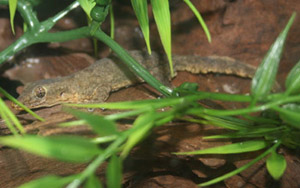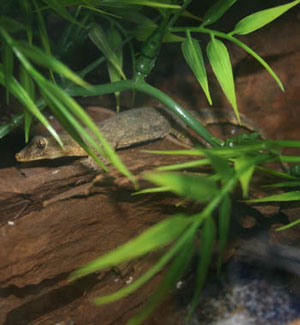House Gecko - Hemidactylus frenatus
House Geckos are hardy, inexpensive small lizards which are a fairly easy to maintain in captivity. They are very fast moving which makes them almost impossible to handle. Originally from South East Asia they have been introduced to many other countries around the world, Eastern Africa, New Guinea, Mexico, Madagascar Australia. Due to thier size and hardiness, these reptiles have become invasive species. These are easy pets to maintain and really don't need much care. As stated above they are fast - so if you want a cuddly herp this is not for you - a bearded dragon would fit that need. Other than the fact they are strictly cage animals and when you go to clean the tank you will need to make sure the house gecko does not escape - I would rate this an excellent pet.
DO NOT FEED WILD INSECTS OR INSECTS FOUND AROUND THE HOUSE – THEY MAY CARRY DISEASES THAT COULD BE DEADLY TO YOUR PET

Average Size - Average size 3" but Large adults can reach up to 5"
Life Span - 5+ years with proper care.
Diet - Provide a variety of insects, including crickets, waxworms, butter worms, small mealworms. Another good food are fruitflies - and with a little luck you could raise your own supplymaking the food needs of these pets free. Remember to "gut load" crickets a day before offering to your pet. This can be done by feeding with any of the commercial insect foods available at pet shops. You should also dust crickets or other insects about twice each week with a calcium and vitamin supplement.
Feeding - Feed adults every other day; juveniles daily
Housing - An cage 18" x 2' x 9' will house a small group. A 10 gallon tank is minimum. For decor use branches, driftwood, artificial plants, rocks, cork bark. These herps will hide if given the chance.
 Substrate - For substrate use bark chippings and or Sand.You can also use pelleted or mulch-type; geckos may eat their substrate; if they do, switch to something they cannot eat, like paper or cage carpet, or an edible substrate. Substrate - For substrate use bark chippings and or Sand.You can also use pelleted or mulch-type; geckos may eat their substrate; if they do, switch to something they cannot eat, like paper or cage carpet, or an edible substrate.
Habitat - Thick branches for climbing; decor and an area elevated off of the floor of the habitat for hiding are also recommended; humidity of about 75% should be maintained in the habitat at all times
Temperature - Day time 75 degrees F to 88 degrees F., Night time 65 degrees F. to 70 degrees F. Moderate to high humidity, this can be achieved by regularly misting. We Recommend radiant heat; use an incandescent light or ceramic heater as primary heat source Lighting. Provide fluorescent light for 10 to 12 hours a day; incandescent bulb is needed for basking area if not using a ceramic heater
Water - May not drink from a bowl; misting the tank may be necessary to provide moisture on non-toxic plants and in collecting pools in the tank; a shallow bowl of fresh, chlorine-free water should be available daily for when they do drink or “bathe”
Housing - House adult males separately
Lighting - Provide UVB rays with full spectrum fluorescent light for 10 to 12 hours a day; incandescent bulb is needed for basking area of about eighty-five degrees F and this can be achieved with a clamp lamp using a sixty watt bulb. My house gecko is mainly active at night. The pictures below are my pet.
Recommended Supplies:
- Habitat with secure lid
- Basking rock and logs
- Humidity gauge
- Book about geckos
- Shallow water bowl
- Vitamin/mineral supplement Non-toxic plants, branches
|
- Incandescent light or ceramic heater
- Thermometer
- Substrate
- Heat source
- Mist bottle
- hide box
|
Normal Behavior and Interaction House geckos are fast moving, making handling difficult; their tail can detach easily, so use extreme care when feeding. Adult males have preanal and femoral pores. The Female lays two hard shelled eggs. Incubation temperature 88f, Eggs hatch between 50-65 days. Hatchlings measure about 2". They are nocturnal and hide during the day
Habitat Maintenance Change water and remove feces daily; mist several times a day to maintain humidity
Thoroughly clean the tank at least once a week. Set gecko aside in a secure tank/container. Scrub the tank and furnishings with a 3% bleach solution; rinse thoroughly with water, removing all smell of bleach; add clean substrate
Grooming and Hygiene Always wash your hands before and after touching your gecko or habitat contents to help prevent Salmonella and other infectious diseases
Geckos regularly shed their skin; ensure humidity of habitat to allow proper shedding
Signs of a Healthy Pet:
- Consistent behavior
- Healthy skin
- Clear eyes
|
- Eats regularly
- Clear nose and vent
- Body and tail are rounded and full
| Common Health Issues and Red Flags:
- Mucus in mouth or nose
- Lethargic
- Swelling
- Labored breathing
|
- Paralysis of limbs or tail
- Abnormal feces
- Bumps, sores or abrasions on skin
- Weight loss or decreased appetite
|
If you notice any of these signs, please contact your exotic animal veterinarian.
As with all pets in this category, it is important that you find a veterinarian that practices in EXOTICS – this is critical. The typical small animal practitioner may not have sufficient knowledge in this area. Even this guide is general in nature and should not be used to diagnose your pet.
|



 Substrate - For substrate use bark chippings and or Sand.You can also use pelleted or mulch-type; geckos may eat their substrate; if they do, switch to something they cannot eat, like paper or cage carpet, or an edible substrate.
Substrate - For substrate use bark chippings and or Sand.You can also use pelleted or mulch-type; geckos may eat their substrate; if they do, switch to something they cannot eat, like paper or cage carpet, or an edible substrate.